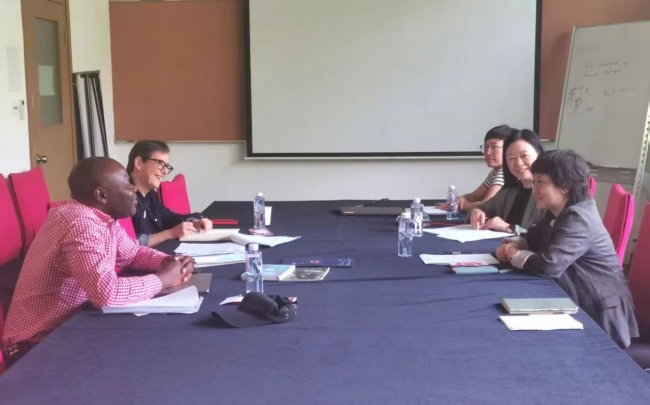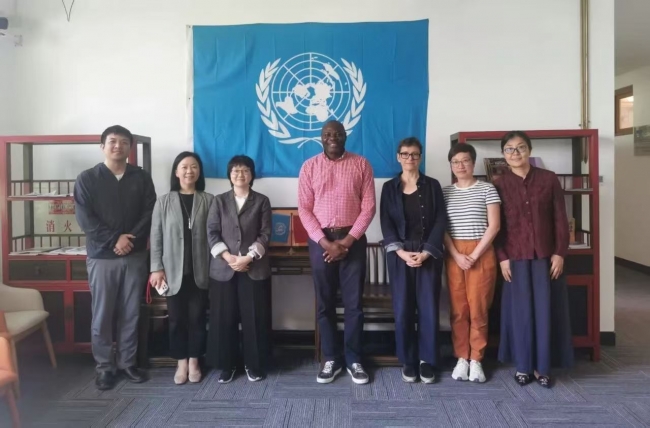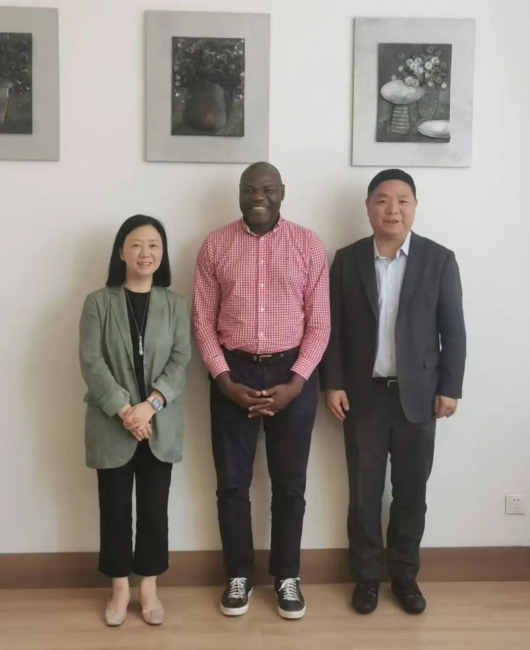| News | UN-HABITAT meets WHITR-AP |
| PublishDate:2025-06-16 Hits:1928 |
| On 3 June 2025, Remy SIETCHIPING, Chief of Policy, Legislation and Governance Section, Urban Practice Branch, Global Solutions Division, UN-Habitat, visited WHITR-AP Shanghai. Professor LI Xiangning, Vice President of Tongji University, and Professor WANG Lan, Dean of the College of Architecture and Urban Planning (CAUP), met with him to review the longstanding collaboration between Tongji University, CAUP, and UN-Habitat in areas such as student exchange and technical cooperation. They also explored opportunities for future partnerships in training and research focused on sustainable urban and rural development. Mr. Sietchiping also held discussions with Prof. SHAO Yong, Secretary-General of WHITR-AP and Professor of urban planning at CAUP, Tongji University; ZHANG Kai, Vice Director of the Heritage Conservation and Culture Revitalization Institute at Shanghai Tongji Urban Planning and Design Institute Co., Ltd. (TJUPDI); LU Wei, Executive Deputy Director of WHITR-AP Shanghai; and Marie-Noël TOURNOUX, Project Director of WHITR-AP Shanghai. The meeting focused on identifying areas of cooperation in heritage-led territorial development and exchanging views on the development of a strategic cooperation between WHITR-AP and UN-Habitat.  Meeting Discussion
 Mr. Sietchiping visit WHITR-AP
More about UN-Habitat and the New Urban Agenda UN-Habitat is the United Nations programme focused on human settlements and sustainable urban development. Established in 1977, it aims to promote socially and environmentally sustainable cities, towns, and communities, striving for adequate shelter and better living standards for all. UN-Habitat serves as the focal point for urbanization and human settlement matters within the UN system, collaborating with partners to build inclusive, safe, resilient, and sustainable cities. UN-Habitat’s Policy, Legislation and Governance Section (PLGS) is one of five sections of the Urban Practice Branch and supports national and subnational governments and other partners through the development and dissemination of knowledge, capacity building, conducting policy dialogues and providing advisory services on urban policy, legislation, governance, metropolitan management, and urban-rural linkages . The New Urban Agenda is a global framework adopted at the United Nations Conference on Housing and Sustainable Urban Development (Habitat III) in October 2016. It aims to promote sustainable urban development and contribute to the localization of the 2030 Agenda for Sustainable Development, particularly focusing on making cities inclusive, safe, resilient, and sustainable. The agenda emphasizes the importance of national urban policies, urban legislation, and stakeholder engagement to drive sustainable urban development. It sets a new global standard for urban planning and management, encouraging innovative approaches to address urban challenges.  Group Photo
Contributed by Marie-Noel Tournoux Designed by Ding Weiyun (Intern) Yang Wenhui(Intern) Edited by Liu Zhen Reviewed by Shao Yong |
- Lecture: Preventive Archeology
- New Year Message | UNESCO World Heritage Centre for Training and Research in the Asia and Pacific Region (Shanghai) Extends to You Its Sincere New Year Wishes!
- Review | Cooperation between Xiamen, CNR and WHITR-AP Shanghai
- Review | Yunlong International Workshop on Vernacular Heritage
- Review | The Heritage Educational Landscape Exhibition
- Review | UHC-HEI 1st General Assembly
Copyright © 2009-2012 World Heritage Institute of Training and Research-Asia and Pacific (shanghai)


